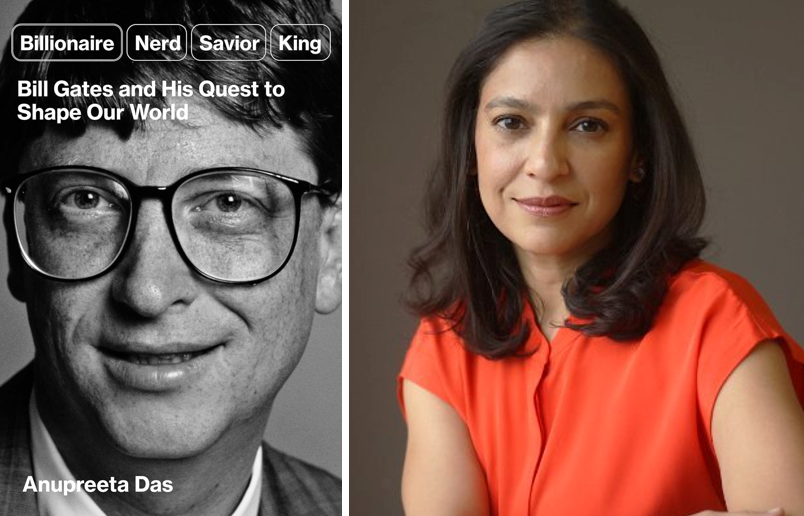
[Editor’s Note: This week’s guest host, Ross Reynolds, is an interviewer and moderator well-known in the Seattle region from his 34 years at KUOW, the public radio station from which he retired in 2021.]
Who is the real Bill Gates? Anupreeta Das delves into this question in her new book, “Billionaire, Nerd, Savior, King: Bill Gates and His Quest to Shape Our World.” Das is the South Asia correspondent for The New York Times.
Listen to the conversation below and continue reading for highlights, edited for clarity. Subscribe to GeekWire on Apple Podcasts, Spotify, or wherever you listen.
Why did you decide to write this book?
Anupreeta Das: Back in 2021, when Bill Gates and Melinda French Gates got divorced, I got involved in reporting on Gates’ fortune because I had written about it going back to 2014. The fate of that wealth became relevant due to the Gates Foundation.
Prior to the divorce, there was a period involving Jeffrey Epstein, the convicted sex offender, and Gates’ connections with him. I thought, “Who is this person?” I had always seen him as the Microsoft co-founder and global philanthropist but hadn’t paid much attention beyond that.
That was my “aha moment.” I decided to explore who this persona was, who the person behind it was, and what it says about how we engage with billionaires.
What are your thoughts on what you learned, and what still remains unknown, about Bill Gates’ Epstein connection?
Das: The question is why one of the world’s most famous billionaires would need the assistance of someone like Epstein. That remains a mystery. Gates has always said it was a lapse in judgment.
What confuses me is that there are many people around Gates. Did they not advise him? Even a simple Google search would show Epstein was shady. So that part has never been entirely clear.
[Editor’s Note: GeekWire contacted Gates’ representatives for comment on the book. They responded with this statement: “Relying almost exclusively on second- and third-hand hearsay and anonymous sources, the book includes highly sensationalized allegations and outright falsehoods that ignore the actual documented facts Mr. Gates’ office provided to the author on numerous occasions.”]
In your book, you place Bill Gates in the context of billionaires, and the myths we have about them. One is that they’re self-made. What does the myth of the self-made billionaire leave out?
Das: His mom was on the board of the University of Washington, and his dad was a prominent lawyer and community leader. This gave him access to the latest developments at that time. While brilliance is necessary, starting at a higher level than most others gives a significant advantage.
The lack of downside risk struck me. Gates would have had a successful career even if Microsoft had failed. This security perhaps allowed him to take bigger risks.
A lot has been written about how hard-driving Bill Gates was and how harsh he was. When he left Microsoft and became a full-time philanthropist, there was a noticeable shift in his behavior. Was that intentional?
Das: Until the Epstein revelations, Gates was seen for years as the most-admired man in the world. His reputation was that significant. Even now, he receives a head-of-state welcome wherever he goes. It’s difficult to criticize someone like Gates because he does a lot of good and is highly visible, which helps him.
And yet, some people at the foundation find a meeting with Bill Gates terrifying, despite his supposed transformation into a benevolent philanthropist.
Das: In the tech world, people understood his intensity. But at the foundation, where staff often come from the genteel worlds of academia or policy, being spoken to that way was a rude awakening. They were hired for their expertise, and facing such intensity was unexpected. You either comply, quit, or stay for the cushy job and the belief in the foundation’s work.
How does the annual giving by the Gates Foundation and its influence in charitable areas compare to other foundations, and to governments or the United Nations?
Das: The Gates Foundation institutionalized what I call Big Philanthropy—a very data-driven approach. They select verticals, identify nonprofits to fund, and hold them to certain standards with metrics and assessments.
Nonprofits on the ground may spend significant time providing these metrics to assess the program’s success because it’s tied to the foundation’s money.
The level of engagement is unusual. Mike Bloomberg’s philanthropies are similar in the scale of giving, but they don’t have such a tight grip on how the funds are used. So, in that sense, the Gates Foundation is unique.
You didn’t get to talk to Bill Gates, but if you had the chance, what would your first question be? What would you most want to know from him?
Das: I’d ask if he agrees with how the world perceives him. Does he have humility about it? How self-aware is he about his image, and how does he use that perception? Does he put ego aside to make the best use of the goodwill he has?
I believe Gates would understand what the book aims to convey. The Economist review talked about the influence of billionaires and my attempts to address this. Gates reads The Economist cover to cover, so he likely read that review. The question is, does he agree?
Anupreeta Das will be speaking in Seattle on Thursday, Sept. 19, at Third Place Books in the Ravenna neighborhood.
Audio editing by Curt Milton.




